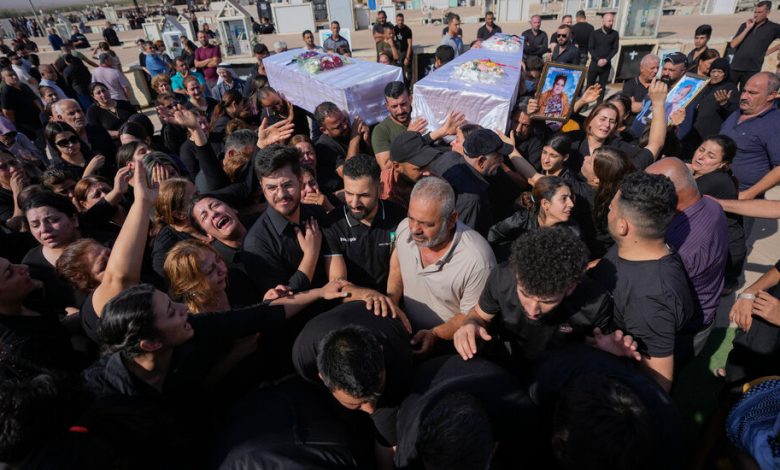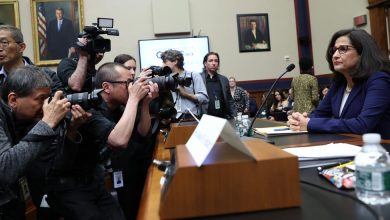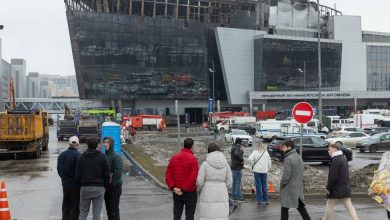Iraq Wedding Fire’s Death Toll Rises, as Investigators Point to Safety Violations

The sounds of mourning have coursed through the small Christian town of Qaraqosh in northern Iraq since late Tuesday, when a fire destroyed a wedding hall in the middle of a reception, touching not only this village, but Iraq’s entire Christian community.
As of Friday night, at least 119 people were dead and an unknown number of others were still missing of the roughly 1,000 guests in attendance. About 80 people remained in hospitals, including more than a dozen who were flown to burn centers in neighboring countries.
The sense of loss here is mixed with anger and disbelief as a report from the initial investigation into the fire’s cause found what many witnesses had already said: The wedding hall violated basic safety requirements and lacked emergency exits and a sprinkler system. The building’s construction material was also highly combustible and seems to have been made of material similar to that used in Grenfell Tower in London, a low-income apartment block that caught on fire in 2017, leaving 72 people dead.
To many in Qaraqosh, the fire was yet another example of how Iraq’s business and government culture is so beset by corruption, incompetence and petty greed that it routinely puts people’s lives at risk for profit.
“How can a wedding hall like this be allowed to stay open when it did not meet any of the safety requirements?” asked Hanan Matti, who heads the Beth Nahrain Organization for Women in Qaraqosh, which advocates for the rights of women and children.
Prime Minister Mohammed Shia al-Sudani visited the Hamdaniya district, where the fire took place, and the nearby provincial capital of Mosul to meet with investigators and to visit the wounded in hospitals.
At the fourth-century Syriac Catholic monastery of Mar Behnam and Mart Sarah in Hamdaniya, where prayers were held for those who lost their lives, Mr. Sudani offered condolences and pledged to hold accountable those responsible. Calling the fire “heart-wrenching,” he added that it “affected all Iraqis” and was “a reinforcement of bonds of unity and brotherhood” across sects and faiths.
Mr. Sudani said families who lost relatives would receive compensation.
The fire began late Tuesday night in the Al Haithem wedding hall during the traditional “slow dance” of the bride and groom. To mark the moment, a few people lit flares, and as the sparks flew up, they ignited decorations on the ceiling and chandelier. The fire quickly engulfed the hall, and the lights went out.
As flaming decorations fell from the ceiling, the guests struggled to reach the building’s main entrance, the only escape route that most knew about. Some fled through a kitchen door.
Reports of the injuries that many of the survivors sustained — severe burns, smoke inhalation damage and crushed bones from people trampling one another to get out amid falling furniture — showed that it was a nightmare come to life. Among the dead were 27 children under 12, said Dr. Basher Al-Jadir, the spokesman for the provincial health department in Mosul.
Iraq has an ancient Christian minority made up of sects that have almost vanished outside the Middle East. The few that have remained live in small villages in northern Iraq, as well as in the large cities of Baghdad and Mosul, and in Erbil in Iraqi Kurdistan.
When the Islamic State took over northern Iraq in 2014, the terrorist group expelled Christians in many places, including in Qaraqosh. Christians have only recently begun to return and raise families in the area again.
Although the vast majority of Iraqis are Muslim, disasters like fires, drownings and explosions caused by carelessness and corruption have touched every religious and ethnic community.
But among the dwindling numbers of Christians in Iraq, there is an especially deep sense of connection. Christian churches not only in northern Iraq but in Baghdad held special prayers for those who died. Many people had a distant relative or knew someone who had been at the wedding.
The draft report from the investigation, ordered by Mr. Sudani, found that in addition to lacking emergency exits and sprinklers, the building had been constructed illegally on agricultural land — a common practice in Iraq as those who no longer farm seek to make money off their fallow acreage.
The report also said the building was made of a substance described by investigators as Ecobond board, which itself is not illegal, but its use must be approved on a case-by-case basis because certain types are highly flammable. It is known locally as sandwich board because it consists of two layers of metal with a synthetic filling between them.
Investigators said the Ecobond panels used in the wedding hall contained a polyethylene core that was highly flammable. The Grenfell Tower building was wrapped in an aluminum cladding with a polyethylene core.
The report found negligence by the owner of the hall — who was detained by the authorities on Wednesday — and his two partners; by the local province’s tourist commission because it had fined the owner for failing to meet fire safety requirements, but did not close the hall; by the mayor of Qaraqosh because he knew about the failings, but, the report said, did not do anything about them; and by other administrative units aware that the hall was illegally built but failed to take any action.
For many people in the area, the fire and the report were painful reminders of the combination of corruption, weak governance and lack of accountability in Iraq.
Many said they thought of the springtime holiday of Nawroz in 2019, in nearby Mosul, when a motorized raft capsized on the Tigris, flinging some 200 people into the rushing current.
More than 100 died and scores more remain missing and are presumed dead. The ferry owner was found responsible for safety violations and went to prison. But investigators also identified a hidden partner with powerful political connections who was never held to account.
More recently, two fires in Covid wards in government hospitals in Baghdad and Naseriya took the lives of about 150 people because of weak emergency procedures and lax enforcement.
As processions of mourners walked this past week through the small town of Qaraqosh, some singing prayers over plain wood coffins while others wept or keened, the family of the bride and groom — who themselves managed to escape — were overwhelmed with feelings of guilt and loss.
“Just four days ago, I invited my relatives, my neighbors to attend the wedding of my son, and today I am mourning the death of their families,” said Esho Bahnam Kahak, 60, the groom’s father, who said that he lost 15 members of his own family, and that five more were still missing.
“We know the reason is the owner of the hall and the officials who allowed the construction of a hall where there were no safety measures and no fire extinguishers,” he said. “Where were the exits? How can someone be allowed to build a hall with flammable materials that burn immediately? It’s greed and negligence and corruption that killed all those innocent people.”
“But, still, I feel as if I am the reason for what happened and I cannot forgive myself,” he said. “As I walk through our town, I look at the houses and they hold nothing but ghosts.”
Falih Hassan contributed reporting from Baghdad.



